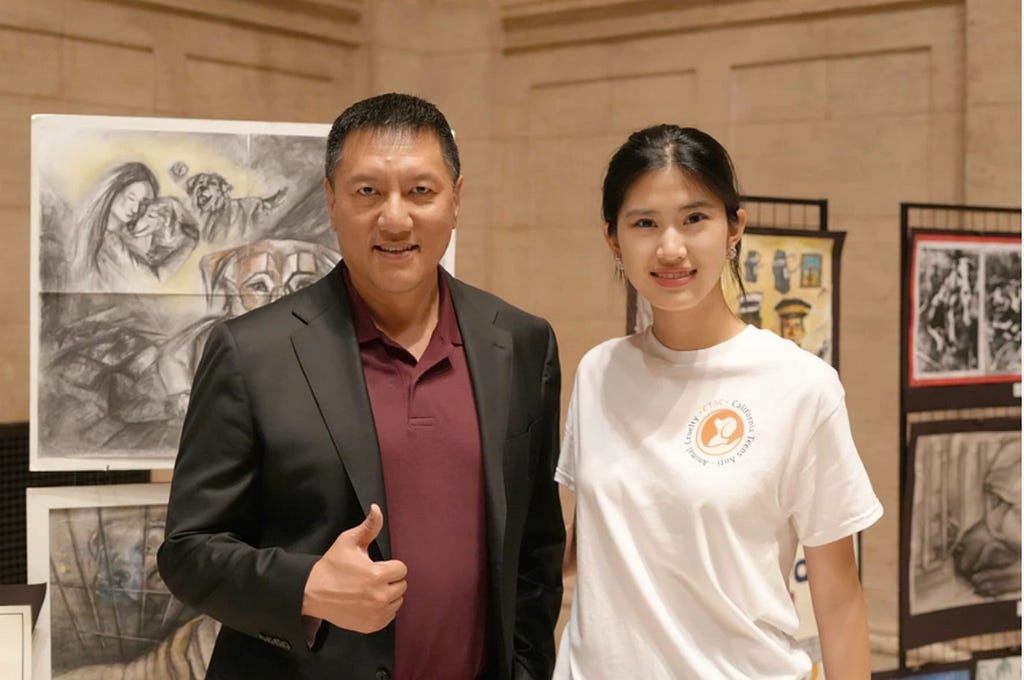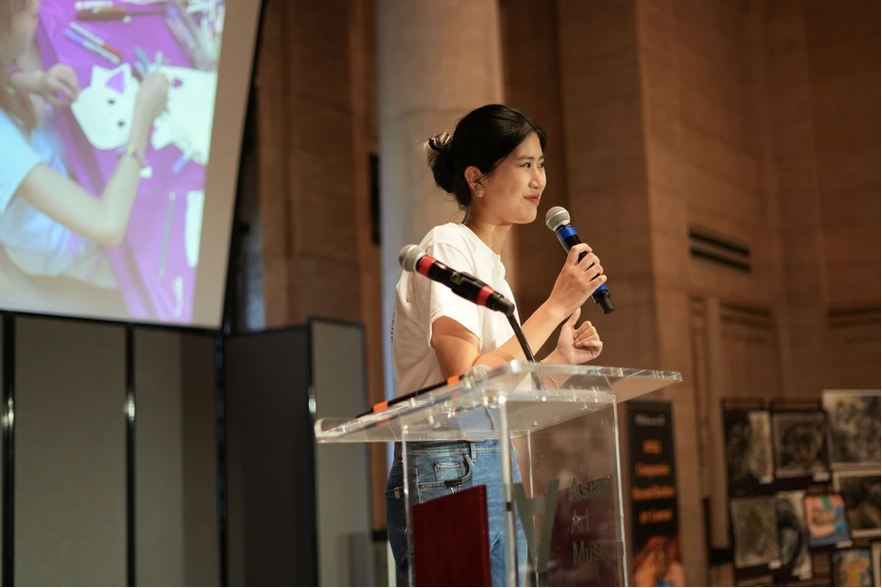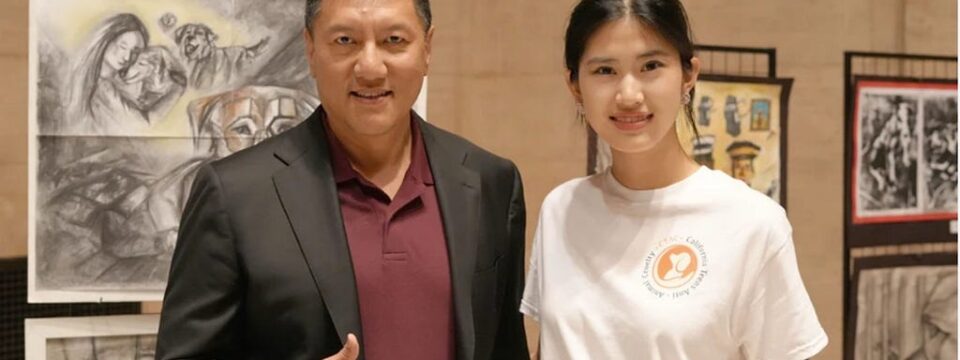
Be Willing to Email and Reach Out: Networking is crucial. Reaching out to potential supporters, partners, and mentors can open doors and provide valuable resources.
As part of my series about young people who are making an important social impact”, I had the pleasure of interviewing Selena Jiang.
Ms. Selena Jiang is a high school senior in Woodside, California. She grew up in China before moving to the United States. When she moved to the U.S., she began volunteering with animal protection organizations and shelters after growing up in an area where eating dogs was part of the cultural practice. She is determined to bring awareness to help protect animals, especially dogs. She currently has artwork on display in an animal protection gallery in China. She is also involved in Walk to End Alzheimers, Parkinson Movements and the DuoDUo Project: anti-dog eating.
Jiang graduates in 2025 and looks forward to continuing her work to advocate for animal rights and protection.
Thank you so much for doing this with us! Before we dig in, our readers would like to get to know you a bit. Can you tell us a bit about how you grew up?
I grew up in a family that has always been passionate about dogs. Almost all my relatives have dogs, and my aunt, in particular, has three that she treats like her own children. This nurturing environment fostered my deep affection for dogs from an early age.
I was raised in the northeastern part of China, where eating dog meat was relatively common. As a child, I found this cultural practice deeply troubling, and it fueled my desire to advocate for animal protection. The emotional impact of this experience stayed with me, and played a significant role in motivating me to start this nonprofit.
As a child in China, I had a beloved dog, and parting with him when I moved to the United States was excruciating. I also witnessed my aunt’s helpless cries when her dog was stolen and sold off. These personal experiences have given me a deep understanding that dogs are not only animals but loyal companions, and family members.
You are currently leading an organization that aims to make a social impact. Can you tell us a bit about what you and your organization are trying to change in our world today?
CTAC — California Teens Anti Animal-Cruelty — is a nonprofit dedicated to reducing unnecessary euthanasia of stray dogs and advocating for responsible pet ownership. According to the American Society for the Prevention of Cruelties to Animals, approximately 920,000 sheltered animals are euthanized, often despite being healthy and adoptable. We aim to address this issue by preventing these deaths through increased care and support.
We aim to tackle this problem by focusing on education and awareness. We want to encourage people to take responsibility when adopting pets and to avoid abandoning or selling them. By promoting adoption over purchasing and ensuring that pets are properly cared for, we aim to reduce the number of stray dogs on the streets.
We believe in the power of art to convey our message effectively. Art is a profound medium for expressing emotions and raising awareness. By utilizing art, we can engage people on a deeper level and foster a greater sense of empathy and responsibility toward animals.
Can you tell us the backstory about what inspired you to originally feel passionate about this cause?
My passion for this cause stems from my childhood experiences in northeastern China. The harsh winters there were accompanied by a cultural practice where dog meat was consumed to keep warm. During these times, it was common to see dog meat served at the dinner table, especially around New Year’s. This practice deeply unsettled me, as I could not accept the idea of dogs being killed for this purpose.
After moving to the United States, I became involved with animal protection organizations and volunteered at shelters. It was here that I learned about the heartbreaking reality of stray dogs being euthanized if they remained unadopted for too long. Witnessing this cruel outcome further fueled my determination to make a difference.
These experiences inspired me to establish CTAC. I wanted to create an organization that not only raises awareness but also advocates for these voiceless animals, giving them a better chance at life and a voice in our society.
Many of us have ideas, dreams, and passions but never manifest it. They don’t get up and just do it. But you did. Was there an “Aha Moment” that made you decide that you were going to step up and do it? What was that final trigger?
The final trigger for me was attending a significant event hosted by an animal protection organization. I went to an event in Sunnyvale where Miss Andrea Gung, the founder of Duo Duo Project, spoke about her experiences starting her nonprofit and her efforts to combat the practice of dog meat consumption.
Hearing her share her journey and the impact she was making was truly inspiring. If she could overcome challenges and create change, then I could also take action to address the issue of stray dogs being unfairly euthanized. Her story gave me the confidence to believe that I could make a difference as well, and that was the pivotal moment that motivated me to step up and start CTAC.
Many young people don’t know the steps to take to start a new organization. But you did. What are some of the things or steps you took to get your project started?
To start my nonprofit, California Teens Anti Animal Cruelty (CTAC), I followed these steps:
Identify a Cause: I chose to focus on stray dog euthanasia because it’s an important issue.
Research: I learned about the problem, existing solutions, and potential partners. **Form a Team:** I gathered passionate peers who shared my vision.
Legal Setup:** We registered the nonprofit and handled necessary paperwork. **Fundraising:** We organized events and sought donations to fund our activities.
Awareness Campaigns:** We planned initiatives like the art contest to spread our message.
Can you share the most interesting story that happened to you since you began leading your company or organization?
Navigating the balance between leadership and friendship has been both a challenging and rewarding experience for me. Initially, I was concerned about how to effectively juggle these two roles. As we built CTAC, I discovered that fostering friendships with my volunteers could be an organic and fulfilling process.
At the outset, we focused on achieving our goals and completing tasks. However, as we spent more time working together, personal connections naturally developed. I made a conscious effort to get to know each volunteer on a deeper level — learning about their interests and sharing my own experiences.
Balancing leadership and friendship became more intuitive as I created an inclusive and supportive environment. I encouraged open communication and emphasized that every idea was valued. We celebrated our successes together, which strengthened our bonds, and I remained approachable, fostering genuine conversations.
This blend of leadership and friendship not only helped us achieve our objectives but also built a strong, cohesive team. Everyone felt comfortable sharing their thoughts and collaborating, which was incredibly fulfilling. It was heartening to see how our shared passion for the cause brought us closer together as friends while remaining dedicated to CTAC’s mission.
It has been said that our mistakes can be our greatest teachers. Can you share a story about the funniest mistake you made when you were first starting? Can you tell us what lesson you learned from that?
When I was organizing our art contest for CTAC, our team created a submission form on Google Drive. However, I didn’t realize my drive was out of storage, so many submissions were lost. It was a big scramble for my nonprofit board to reprint all our submission posters with the new code. The lesson? Always check your storage space and have backups ready!
None of us can be successful without some help along the way. Did you have mentors or cheerleaders who helped you to succeed? Can you tell us a story about their influence?
The California state treasurer, Fiona Ma, has been an incredible mentor and a tremendous source of support for me. Her ambition and intelligence are truly inspiring. Whenever I find myself procrastinating, I think about her achievements and the hard work she has put into reaching her current position. This reflection motivates me to get back on track and focus on my tasks.
Despite her demanding schedule, she consistently makes time to provide guidance and encouragement. Her tireless dedication to her goals has been a powerful example for me, helping me push through my own challenges. Moreover, her belief in my vision for CTAC has given me the confidence to continue pursuing our mission, even when the journey gets tough.
Are there three things the community/society/politicians can do to help you address the root of the problem you are trying to solve?
Promote Spay and Neuter Programs: Encouraging and funding spay and neuter programs can help reduce the number of stray dogs and prevent overpopulation.
Support Animal Shelters: Increased funding and resources for animal shelters can improve their capacity to care for stray dogs and find them homes.
Raise Public Awareness: Launching campaigns to educate the public about stray dog euthanasia and responsible pet ownership can drive community involvement and support.

What are your “5 things I wish someone told me when I first started” and why?
- Be Willing to Email and Reach Out: Networking is crucial. Reaching out to potential supporters, partners, and mentors can open doors and provide valuable resources.
- Expect the Unexpected: Plans often change, and unexpected challenges arise. Flexibility and adaptability are key to handling these situations effectively.
- Budget Wisely: Financial management is vital. Keeping a close eye on your budget and planning for contingencies can prevent financial shortfalls.
- Seek Feedback: Constructive criticism helps you grow. Regularly asking for feedback from your team and supporters can improve your projects and initiatives.
- Self-Care is Important: Running a nonprofit can be demanding. Taking care of your mental and physical health ensures you have the energy and resilience to lead effectively.
If you could tell other young people one thing about why they should consider making a positive impact on our environment or society, like you, what would you tell them?
Making a positive impact on our environment or society is incredibly rewarding. It gives you a sense of purpose and connection to your community while also helping you learn more about yourself and your passions. Even small actions can lead to significant changes, and you have the power to inspire others to join you. Plus, working towards a cause you’re passionate about can help you develop valuable skills and relationships that will benefit you.
Is there a person in the world, or in the US with whom you would like to have a private breakfast or lunch, and why? He or she might just see this, especially if we tag them. 🙂
I would love to have a private breakfast with Serena Williams. As an incredible female athlete and advocate for equality, her journey has inspired many, including me. I admire her determination and resilience as a woman in sports. A conversation with her would provide valuable insights on overcoming challenges and using one’s platform for positive change. Plus, her experiences in balancing sports and activism as an influential female figure would be fascinating to hear about!
Thank you so much for these insights! This was very inspirational and we wish you continued success in your great work.
Young Social Impact Heroes: Why and How Selena Jiang Is Helping To Change Our World was originally published in Authority Magazine on Medium, where people are continuing the conversation by highlighting and responding to this story.
